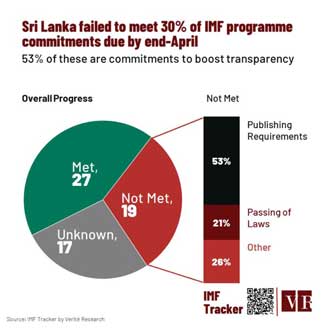Thursday Feb 19, 2026
Thursday Feb 19, 2026
Saturday, 18 May 2024 01:24 - - {{hitsCtrl.values.hits}}
 Sri Lanka has failed to meet 30% of its due commitments end-April 2024 under the International Monetary Fund (IMF) program according to the latest update by publicfinance.lk (run by Verité Research, an independent think-tank).
Sri Lanka has failed to meet 30% of its due commitments end-April 2024 under the International Monetary Fund (IMF) program according to the latest update by publicfinance.lk (run by Verité Research, an independent think-tank).
The failure to meet due commitments also translates for a total of 19 unfulfilled obligations, with the majority of these ‘not met’ commitments pertaining to enhancing transparency and enacting legislation.
The analysis provided by the IMF Tracker by Verité Research sheds light on the status of Sri Lanka’s commitments, categorising them into met, not met and unknown.
Accordingly, the ‘not met’ commitments are categorised as follows: 53% pertain to publishing requirements, 21% involve the passage of legislation and 26% are classified under other categories. These findings underscore the critical need for Sri Lanka to prioritise governance reforms to address the root causes of its economic challenges.
Of the 19 ‘not met’ commitments 10 are related to transparency and publishing requirements, which include; public semi-annually public procurement contracts and estimation of tax exemptions, publish direct costs of tax incentives granted via the SDP and BOI act, publication of a Government action plan for implementing recommendations in the Governance Diagnostic report, ensure that the annual reports for 2022 of all 52 major SOEs are published, publish audited financial statements of all but five SOEs, publish quarterly debt bulletins, publishing implementation plans for the Anti-Corruption Act, introduction, tracking and reporting quarterly KPIs of tax compliance, reporting of monthly cash flows by the Department of State Accounts and implementation of the amendments to the Banking Act.
Sri Lanka fails...
A total of four factors are in terms of enacting legislation category and these include; introducing automatic indexation of exercises to inflation, submission of the Public Finance management law to Parliament, enact legislation on assets recovery in compliance with the UNCAC and making legislative changes to set up a debt management agency were not fulfilled.
Other five ‘not met’ commitments include; obtain Cabinet approval of a strategy to build a VAT refund system and achieve a full repeal of SVAT, with timeline and intermediate steps, obtain Cabinet approval of a reduction in the limit on government guarantees to 7.5% of GDP, complete implementation of ITMIS, social spending to 0.6% of GDP (Rs. 187 billion) by December 2023 and ensure that starting from January 2024, cash transfers under Samurdhi will cease.
The second round of IMF program funding came in December 2023.
Published on Public-Finance.lk, Sri Lanka’s leading economic insights platform, the analysis by Verité Research provides valuable insights into the country’s progress in meeting its IMF commitments. The IMF Tracker serves as the only publicly available platform tracking Sri Lanka’s obligations under its 17th IMF program.
It is available on https://bit.ly/4biFJhr.